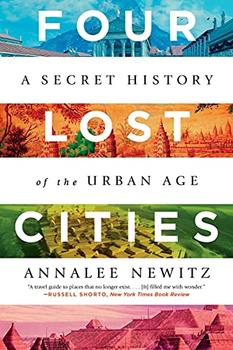
A Secret History of the Urban Age
A quest to explore some of the most spectacular ancient cities in human history―and figure out why people abandoned them.
In Four Lost Cities, acclaimed science journalist Annalee Newitz takes readers on an entertaining and mind-bending adventure into the deep history of urban life. Investigating across the centuries and around the world, Newitz explores the rise and fall of four ancient cities, each the center of a sophisticated civilization: the Neolithic site of Çatalhöyük in Central Turkey, the Roman vacation town of Pompeii on Italy's southern coast, the medieval megacity of Angkor in Cambodia, and the indigenous metropolis Cahokia, which stood beside the Mississippi River where East St. Louis is today.
Newitz travels to all four sites and investigates the cutting-edge research in archaeology, revealing the mix of environmental changes and political turmoil that doomed these ancient settlements. Tracing the early development of urban planning, Newitz also introduces us to the often anonymous workers―slaves, women, immigrants, and manual laborers―who built these cities and created monuments that lasted millennia.
Four Lost Cities is a journey into the forgotten past, but, foreseeing a future in which the majority of people on Earth will be living in cities, it may also reveal something of our own fate.
"Newitz clearly draws parallels and lessons for the here and now from these once-vast settlements…Highly recommended." ―Booklist (starred review)
"[A] richly detailed, progressively minded history…Newitz skillfully fuses personal reflections with scientific observations, and offers a welcome tribute to the legacy of human resilience." ―Publishers Weekly
"[W]ell-researched, current, and directly applicable to our modern lives…An excellent contribution to literature on ancient civilization and complexity." ―Library Journal
"A revealing look at the ancient past that speaks thoughtfully to the global-warming present." ―Kirkus Reviews
"[E]xcellent…fair, judicious, open-minded…the strength of the book arises from distrust of elites and preference for common people." ―Wall Street Journal
"Annalee Newitz is a brilliant writer with the heart of an archaeologist and the soul of a visionary. Four Lost Cities should open our eyes to all that may happen to our cities in the future. Vibrant and adventurous, this is a necessary book for turbulent times." ―Sarah Parcak, archaeologist and author of Archaeology from Space
"Drawing on four examples from the ancient world, Annalee Newitz gives us clear-eyed insight into how cities never are truly lost; they just change with their times. Newitz takes readers on a journey that reveals as much about the future of cities as it does about our urban past. Beautifully written, Four Lost Cities tells a fascinating tale of disaster and resilience that is welcome in our uncertain era." ―Andrew Lawler, author of The Secret Token
This information about Four Lost Cities was first featured
in "The BookBrowse Review" - BookBrowse's membership magazine, and in our weekly "Publishing This Week" newsletter. Publication information is for the USA, and (unless stated otherwise) represents the first print edition. The reviews are necessarily limited to those that were available to us ahead of publication. If you are the publisher or author and feel that they do not properly reflect the range of media opinion now available, send us a message with the mainstream reviews that you would like to see added.
Any "Author Information" displayed below reflects the author's biography at the time this particular book was published.
Annalee Newitz is an American journalist, editor, and author of fiction and nonfiction. They are the recipient of a Knight Science Journalism Fellowship from MIT, and have written for Popular Science, The New Yorker, and the Washington Post. They founded the science fiction website io9 and served as Editor-in-Chief from 2008–2015, and then became Editor-in-Chief at Gizmodo and Tech Culture Editor at Ars Technica. Their book Scatter, Adapt, and Remember: How Humans Will Survive a Mass Extinction was nominated for the LA Times Book Prize in science. Their first novel, Autonomous, won a Lambda award.
Your guide toexceptional books
BookBrowse seeks out and recommends the best in contemporary fiction and nonfiction—books that not only engage and entertain but also deepen our understanding of ourselves and the world around us.